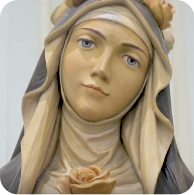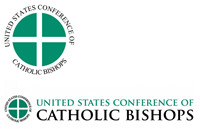The Ministry of Greeters and Ushers
Do not neglect hospitality, for through it some have unknowingly entertained angels. —Hebrews 13:2
Background Information
St. Paul instructed the assembled community to “welcome one another as Christ has welcomed you, to the glory of God” (Rom 15:7) . . .The people are coming as invited guests of the Lord himself, to share in his supper as sisters and brothers. (Introduction to the Order of Mass, #23).
"Hospitality is a vital element in creating a sense of community for worship. A person who feels welcomed and valued is much more likely to enter wholeheartedly into the celebration of the liturgy, giving thanks to God for the love that God pours out on us.” (Rev. Lawrence Mick)
When people come into a public place — whether it be an auditorium, concert hall, or church building — they are able to perceive if preparations have been made for the event. This very “sensing” affects the manner (positive or negative) in which people will enter into the event. “Something important is going to happen” can be said in many ways, not the least of which is the presence of capable, poised welcomers. (Elizabeth Young)
The importance of the Ministry of Hospitality is clear in the above quotations. In the spirit of the ongoing renewal that liturgy requires, we present this series of Questions and Answers regarding the role of ushers and greeters.
Questions and Answers
Is there a difference between “greeters” and “ushers”? Ushering was one of the few roles open to lay people before Vatican II. For many years, ushers helped parishioners find seats in church, take up the offering, dealt with emergencies and handed out bulletins. The liturgical renewal that followed the Council identified the importance of creating a welcoming atmosphere at the entrance of the church. In some parishes, the ushers adapted to this new understanding of their role. In other parishes a separate group of ministers was created specifically to welcome people, not merely as a “social courtesy” but as members of the body of Christ. In reality, however, all members of the assembly are responsible for creating a climate of hospitality.
Why is hospitality so important? Christian hospitality is centered in Christ. It is an expression of reverence for the presence of Christ in each member of the assembly; it is rooted in the sacrament of baptism. True hospitality draws us together and opens us up to participate in the liturgy. An ancient Christian saying expresses it this way: “When a guest comes, Christ comes.”
What do greeters and ushers do before Mass? They need to arrive well before other parishioners (at least 20 minutes before Mass begins). They should make sure that the worship space is free of any clutter that may have been left from a previous service. They greet people at the door (paying particular attention to those who may be visiting or in need of special seating), hand out worship aids and assist people in finding a place to sit.
During Mass, what is their role? Ministers of Hospitality like other liturgical ministers, are first and foremost members of the worshiping assembly. As such, they should join in the act of worship in the same manner as the assembly. Even while performing specific tasks, (e.g. taking up the offering), they remain united to the assembly, singing and praying in an active way. Never should their role separate them from the rest of the assembly. They are to be present and attentive during the entire liturgy. During Mass, they assist in the seating of latecomers, take up the offering, help direct the Communion procession if needed and deal with any disturbances that may occur. They should know the location of rest rooms, the nearest phone, the first aid kit and fire extinguishers. They may also be responsible for choosing the gift bearers.
And at the end of Mass? Their role is to distribute the parish bulletin, direct people toward any social events that may be taking place and to do a general clean up of the worship space. Just as these ministers set the tone for our gathering, they can impact our departing. As we go forth in our mission to love and to serve the Lord, ministers of hospitality can provide a cheerful farewell and a sincere invitation to return as they dispense bulletins or other materials.
Who may serve as a greeter or usher? Although men have traditionally filled the role of “usher” in most parishes, women (as well as teenagers and children) are invited to serve as ministers of hospitality. As St. Paul reminds us: For all of you who were baptized into Christ have clothed yourself with Christ. There is neither Jew nor Greek, there is neither slave nor free person, there is not male and female; for you are all one in Christ Jesus. (Gal. 3:27-28). This ministry is open to all, men and women, who are truly able to welcome people to the community’s prayer. Because this ministry requires an understanding of the nature of liturgical prayer, the ability to relate to people of all ages, and the capability of responding well to sometimes challenging situations, a certain level of maturity is needed. However, when the Ministry of Hospitality is open to families, children often make very effective greeters.
What is appropriate attire for Ministers of Hospitality? Because all liturgical ministers, by their demeanor and attitude, send a message about the importance of what is taking place, it is helpful if they are attired in their “Sunday best.” In some parishes, ministers wear a uniform blazer for visibility so that they can be identified immediately in case of an emergency. In either case, a nametag identifying a person as a minister of hospitality would be helpful.
What are the requirements for becoming a Minister of Hospitality? Those who desire to serve as a Minister of Hospitality should be active and faithful members of the Church. They should be of godly character and reputation. Respect for others, discretion and appropriate decorum are the hallmarks of a Minister of Hospitality. Above all, ministers should be noted for their care to the assembly. These qualities are found in a mature Christian — qualities that transcend chronological age. Furthermore, the minister should be comfortable meeting and greeting others. They must always extend a sense of welcome to others and make them feel at home. Such qualities are a blessing, especially to the stranger in our midst.
To sign-up, select the Ministry Sign-Up button located in the upper left of this page.
For more information please contact:
The Liturgy Office:
(973) 379-3912
St. Rose of Lima Church
50 Short Hills Ave
Short Hills, NJ 07078









